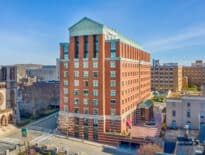Gov. Maura Healey appealed to business leaders and legislators to support her $55.5 billion state budget proposal as a means to protect Massachusetts’ economy from an exodus of residents and businesses.
Healey led off her first address to the Greater Boston Chamber of Commerce as governor by spotlighting high housing costs as the top risk to Massachusetts’ economy.
“The first place we’ve got to begin right now is talking about affordability. We see our proposal as a down payment on Massachusetts’ future,” Healey told the gathering at the Westin Copley Place hotel.
Healey previously announced a proposed new cabinet-level secretary of housing to address the continuing rise in housing costs, even as Massachusetts’ population has declined by more than 100,000 residents since the pandemic. Housing production should be focused near transit and jobs, Healey said.
A Metropolitan Area Planning Council study released in February cited a growing disconnect between jobs and housing in Massachusetts, with many lower-wage workers forced to travel from Gateway Cities to industrial businesses in outer suburbs.
“We need to connect workers with job opportunities and we need to do it yesterday,” Healey said.
An estimated $750 million in tax cuts in the budget proposal would help Massachusetts attract and retrain businesses amid competition from lower-cost states, Healey said, mentioning North Carolina and Texas as examples.
She painted Massachusetts as “an outlier” in some aspects of tax policy, as one of three states that have higher short-term than long-term capital gains taxes. The Massachusetts estate tax’s threshold of $1 million is tied with Oregon for the nation’s lowest, and Healey proposes increasing the minimum to $3 million.
Healey has framed the tax debate as a means to stem the departure of Massachusetts residents in the wake of the pandemic, giving residents with remote work an opportunity to move to lower-cost states. Progressive groups have denounced the proposals.
“The proposed changes to the estate tax would give a few thousand of the wealthiest families in the state a six-figure tax cut, while the cut to the short-term capital gains tax rate would reward wealthy day traders and real estate speculators for their risky financial maneuvering,” Raise Up Massachusetts said in a statement following Healey’s budget announcement earlier this week.
The tax cuts also include relief for renters, in the form of a $1,000 increase in the current $3,000 deduction, along with a doubling of the property tax credit for low-income seniors.
Pressed by Chamber CEO James Rooney about immediate steps to fix the MBTA’s reliability and safety problems, Healey said the agency will be “candid and public” about building a new leadership team including general manager and safety officer, along with hiring hundreds of new dispatchers and operators.
Healey said she is open to “means-testing” MBTA fares, following a two-year-old pilot program that provides free Route 28 bus routes through portions of Roxbury, Dorchester and Mattapan. But a recent MBTA analysis found that most riders did not save money because of costs incurred elsewhere on the MBTA.
“I’ve supported low and no fares options, ” Healey told reporters after the address, noting that $5 million will be allocated for research and pilot studies on the topic. “If we’re going to implement means testing fares, we want to do it in the best possible way.”









